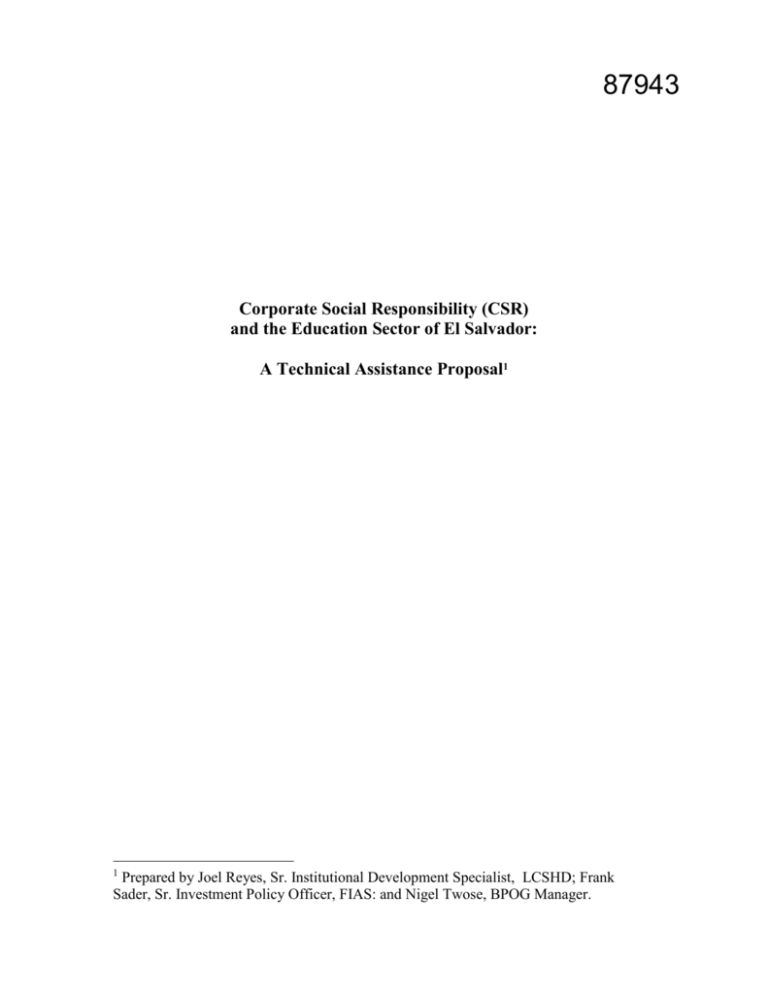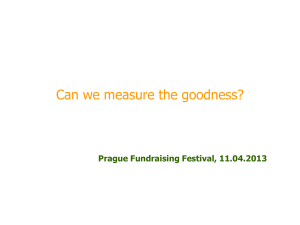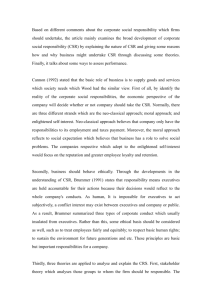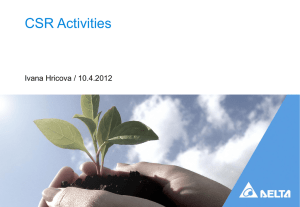II. Aligning CSR with Education Sector Priorities
advertisement

87943 Corporate Social Responsibility (CSR) and the Education Sector of El Salvador: A Technical Assistance Proposal1 1 Prepared by Joel Reyes, Sr. Institutional Development Specialist, LCSHD; Frank Sader, Sr. Investment Policy Officer, FIAS: and Nigel Twose, BPOG Manager. Table of Contents I. Background ..................................................................................................................... 3 II. Aligning CSR with Education Sector Priorities ............................................................ 4 III. World Bank Technical Assistance Proposal for El Salvador’s CSR and Education .... 5 Component 1: Assessing the Pertinence and Quality of CSR Activities. .................. 6 Component 2: Strengthening El Salvador’s CSR Framework and Partnerships ....... 7 Component 3: Support in Operationalizing and Launching FUNDEMAS’ Education Initiatives Fund. .......................................................................................................... 7 Component 4: Dissemination of Lessons Learned. ................................................... 8 Required Technical Assistance Budget .......................................................................... 9 TA Proposal Implementation Time ................................................................................ 9 Formation of an Advisory Group within the Bank ......................................................... 9 IV. Conclusion: Rationale for the Bank’s Involvement and Lessons to be Learned ....... 10 2 Corporate Social Responsibility (CSR) in the Education Sector of El Salvador: A Case Study Proposal I. Background 1. The concept of corporate social responsibility (CSR) as a private sector concerted effort to support with financial and human resources the overall development process of a country is a relatively new label, although not a new phenomenon. Often, corporate social responsibility is not distinguished from corporate philanthropy or charity. This thinking does not recognize the core strengths of companies, the unique competencies they can bring to an alliance, and the mutual benefits that can be achieved. CSR-based partnerships can benefit the long-term interests of the business sector while meeting the development objectives of civil society and government by helping to create stable social and financial environments. 2. It is clear that the greatest impact from CSR expenditures comes when the enabling environment is strong, when activities link to national development priorities, when they are targeted towards poverty reduction, and when they are implemented through partnership processes. Experience from 20 countries demonstrates that such approaches can help broaden and deepen a country’s access to capital; maximize the development benefits of this capital; bridge the gap between communities and local government; and build more effective ‘joined-up’ government. 2 3. In countries such as El Salvador3, these private sector initiatives are unusually strong and well developed compared to most developing countries, and with clear business sector ‘champions’. To an unusually high degree, private sector leaders in El Salvador show concerns that go beyond the profitability of their individual enterprises and ventures. There is a clear understanding of the social concerns in the country and a determined effort from the private sector to assist in the overall social development of the country with direct involvement and initiatives. In general, El Salvador illustrates a clear government strategy of working closely with the private sector on broader social issues 4. This social engagement and willingness to take responsibility by the private sector has resulted in the development of a relatively strong corporate social responsibility (CSR) agenda in El Salvador. In the 1990s, international cooperation and private capital supported the creation of two major foundations in the area of education and broader socio-economic development: FEPADE (Fundacion Empresarial para el Desarrollo Educativo) and FUSADES (Fundacion Salvadorena para el Desarrollo Economico y Social). At the industry level such as textiles or coffee production, industry initiatives have emerged and expanded rapidly to support sustainable business practices, especially 2 World Bank, Business Partnership and Outreach Group El Salvador is geographically the smallest country in the Central American isthmus (21,000km2). However, its population is the second largest with approximately 6 million inhabitants. Its population density is, thus, high: 276 inhabitants per km2. 3 3 with respect to employment and environmental issues. Most recently, private sector businesses and industries have created an umbrella organizations to strengthen and guide corporate social responsibility through FUNDEMAS (Fundación Empresarial para la Acción Social).4 5. One area of particular importance in this corporate responsibility agenda is the education sector. Salvadorian businesses support local schools, provide scholarships for excelling and needed students, and finance a variety of educational events, typically in collaboration with the Ministry of Education. El Salvador has also expanded private education alternatives in the area of technical and vocational training. More recently, private institutions are complementing the need for technical assistance and training in different education areas, for example FUTUREKIDS (specialized in education technology), FUSADES (specialized on the study of the socio- economic aspects of education), and ALFA (specialized in teacher development, community and school-based management, and education reform evaluations). More initiatives are under consideration and preparation, reflecting the strong commitment of the private sector in addressing social development issues, particularly in education. 6. Thus, the country presents itself as a potentially fertile testing ground for developing a coherent and collaborative approach between the private and the public sector in supporting poverty alleviation and social development, with an initial focus on education. II. Aligning CSR with Education Sector Priorities 7. Given the important role of the private sector as a responsible ally for social development, a key question is how private sector CSR initiatives could be better harnessed to strengthen the education sector in the country and where to best position these corporate efforts to address remaining education challenges. 8. Amidst the challenges of a developing medium-income country, El Salvador’s education sector, over the last decade, has set a favorable foundation to achieve basic development goals.5 However, the country still faces important education challenges. The quality of teaching and learning is still low. In standardized test scores, 3rd and 6th graders today still score less than 50% of possible maximum scores (it increased from 4 FUNDEMAS is part of an international alliance for CSR, which includes Accion Empresarial of Chile, Alianza de Organizaciones Empresariales (AliaRSE) of México, Business of Social Responsibility (BSR) of the United States, Instituto ETHOS of Brazil, and PERU 2001 of Peru. Additionally, FUNDEMAS has interacted with Prince of Wales (International Business Leaders Forum) of the UK. 5 In 1993, El Salvador adopted the World Declaration on Education for All and the subsequent Framework of Action to Satisfy Basic Education Needs. By the end of the decade, growth enrolment rates increased from 20% in 1993 to 36% in preschool and from 79% to 90% in Basic Education. Overage-to-grade rates were reduced from 21.5% to 15% during the same years. Moreover, El Salvador became one of the most advanced Latin American countries in terms of community participation and school-based management strategies. 4 40% in the mid 1990s). Repetition rates have reduced slightly from 9.1% to 8.6% in grades 1-6 (but are still high by international comparisons); 60% of preschool children still do not have access to early childhood care and education; 256,000 children, age 817, work; 14% of 14-17 years old youth are inactive (neither work nor attend school) and many are involved in violence and gang activities; about 20,000 people, many of them young adults, live with HIV/AIDS (the adult prevalence rate for infection is still below 1%). In addition, while still recovering from the devastation caused by the war in the 1980s, the country was again adversely affected by the two consecutive earthquakes in January and February 2001. 9. The remaining education challenges in El Salvador are broad and call for strengthening the existing private sector CSR initiatives to make the most productive use of them. Concretely, in the education sector, the following is needed: (i) strengthening a common vision and the strategic framework and networks for CSR, such as FUNDEMAS; (ii) defining what education needs are better addressed and complemented by CSR activities and resources; (iii) attracting and supporting highly qualified education experts to support CSR in education; and (iv) ensuring that CSR activities are aligned with the development objectives of the education sector to maximize potential synergies. 10. An important and concrete CSR activity stepping up to address these unmet needs is the Education Initiative Fund created in FUNDEMAS (the CSR umbrella organization in El Salvador), which will channel resources from industries and corporations to the ongoing needs of the education sector. An initial US$5 million allocation by the beverages group, BEVCO, is intended for high impact and catalytic innovations in education. The Fund is in the process of being designed, operationalized and positioned to address education needs that are both unsolved priorities in the sector and within the competitive advantage of CSR activities. III. World Bank Technical Assistance Proposal for El Salvador’s CSR and Education 11. The Government of El Salvador has recognized the importance of CSR as a key feature of its national competitiveness for trade and investment. The Ministers of Finance and Economy have therefore jointly requested assistance by the Foreign Investment Advisory Service (FIAS) in evaluating the state of CSR initiatives in the country and to develop recommendations of how to strengthen these initiatives such that they can be converted into a national strategy for investment attraction and export promotion. 6 This work is planned to start soon – possibly as part of the World Bank’s competitiveness program in the country – and with collaboration by the World Bank’s Business Partnership Group (BPOG). 12. The corporate side also requested Bank assistance to support FUNDEMAS in operationalizing and launching the Education Initiative Fund.7 Concretely, Bank’s partnership in this endeavour could complement required technical assistance, access to 6 7 April 2002 letter from Minister of Finance of El Salvador, Jose Daboub, to FIAS. Visit of Roberto Meza, President of FUNDEMAS, to the World Bank on February and April 2002. 5 our international CSR networks, and documenting lessons learned, with the following potential benefits: (i) the development of broader CSR initiatives and partnerships in education, (ii) alignment of privately funded education initiatives with the development priorities of the education sector; (iii) development of pertinent incentives and promotion strategies for private businesses involvement in the social sectors; and (iv) exchange of lessons learned regarding CSR activities in education. 13. The Technical Assistance Proposal to strengthen CSR in the education sector of El Salvador will include four key components: (i) Pertinence and Quality of CSR Activities in Education; (ii) Strengthening El Salvador’s Corporate Social Responsibility Framework; (iii) Support in the Operationalization and Launching of FUNDEMAS’ Education Initiatives Fund and (iv) Dissemination of Lessons Learned. Component 1: Assessing the Pertinence and Quality of CSR Activities. Pertinence and Quality of Education CSR Activities Component will support the analysis of education sector needs that are not properly being addressed or that will benefit from private business partnerships. The analytical process will not require new studies, but rather it will review the different analytical work in education in El Salvador produced by the Bank and others. The output would be the selection of strategic lines of action in education, especially suited for CSR, which will guide private investment and contributions in the sector. One immediate beneficiary of this sector analysis for CRS investments in education will be BEVCO’s US$5 million contributions to FUNDEMAS Education Initiatives Fund. Implementation Strategy: FUNDEMAS has selected ALFA (a privately financed institution specialized in education) as its main technical partner to support the development of the Education Initiatives Fund and to design a process to define the strategic education areas for its investment. Thus, World Bank specialists (on education development, business partnership, and institutional development) will work with FUNDEMAS and ALFA in the following activities: (i) reviewing the most recent studies of education needs and vulnerable groups in El Salvador (carried out by various organizations, including the Bank); (ii) designing and implementing a workshop with actors and organizations interested in CSR in education, to define the existing gaps and priority education needs where CRS actions can be better positioned; and (iii) preparing a synthesis report of the gap analysis, CSR positioning in education, and specific strategic investment lines. Concrete Output: Assessment of the shortcomings in the current public sector education strategy based on lack of resources or insufficient impact, and the areas where CSR initiatives can be best positioned. 6 Component 2: Strengthening El Salvador’s CSR Framework and Partnerships The Strengthening El Salvador’s CSR Framework Component will support the integration of FUNDEMAS and the Education Initiatives Funds within the broader CSR Framework being developed in El Salvador with support of FIAS. The goal would be to promote within this broader framework a concrete and existing CSR activity as example of what can be achieved socially through tri-sector partnerships (Government, Private Sector, and Civil Society). Implementation Strategy: This component does not necessarily generates new activities, it rather guarantees that the CSR Education component be an integral part of the broader CSR framework in the country. The FIAS’ CSR Advisory Project will implement most of the activities for the development of El Salvador’s CSR framework. The education CSR example (the Education Initiatives Fund in FUNDEMAS) will be presented in a broad Workshop organized by FIAS, where specific steps will be defined for the Government—and other interested partners— to follow the process, learn from this experience, and incorporate pertinent lessons learned into the broader CSR framework. BPOG is especially well positioned to support in drawing lessons on how to promote and provide business incentives for similar CSR initiatives by other industry groups and corporations. Concrete Output: Presentation of FUNDEMAS’ Education Initiatives Fund and its analysis as a concrete case study for the broader audience and actors defining the CSR Framework in El Salvador. Component 3: Support in Operationalizing and Launching FUNDEMAS’ Education Initiatives Fund. The Operationalization and Launching of FUNDEMAS’ Education Initiative Fund will provided more operational T.A. to FUNDEMAS and ALFA as they proceed to design the operational mechanism of the CSR fund. This operational design work is the responsibility of ALFA as the agency selected and contracted by BEVCO. However, Bank’s involvement will not include specific consultant work but rather access to similar programs and funds in other countries. Ex-change of experiences with similar organizations in other countries (e.g., Colombia, Brazil and other DCs) will show emerging El Salvador’s CSR institutions and their allies (i) how they can complement services provided by the public sector, (ii) how to align their resources and services within the education sector 7 and country priorities, and (iii) how they can operationalize social investments promoting and channelling resources from private corporations willing to allocate resources in the social sectors, especially education. This type of inter-national exchanges will also create networks to disseminate in other countries lessons learned in El Salvador. Implementation Strategy: The World Bank T.A. team will identify possible programs worldwide which may provide lessons learned for the CSR-supported Education Initiative Fund to be designed in FUNDEMAS. In coordination with FUNDEMAS, ALFA and BEVCO one or two study tours will be designed to visit these international experiences in situ.8 Based on the lessons learned from the study tour, pertinent models and operational mechanisms will be drawn to support the design and strengthening of the Fund. Also, the study tour will formalize CSR networks between these countries to leverage additional technical sector. For example, within Central America, FUNDEMAS and ALFA are already forming an alliance for exchange of lessons learned and TA with FEREMA (another privately funded education foundation) in Honduras. Concrete Output: Operational Design of the Education Initiative Fund and Formation of International Alliances with Similar Programs Component 4: Dissemination of Lessons Learned. The Dissemination of Lessons Learned Component will provide (i) feedback to El Salvador’s public and private sector, (ii) CSR support know-how for the Bank , and (iii) for similar initiatives in other client countries. Implementation Strategy: In coordination with FUNDEMAS and ALFA, a strategy and tools will be designed to collect the lessons learned in the (i) development of CSR Framework in El Salvador, through the TA to FUNDEMAS, (ii) the assessment of education sector shortcomings and positioning of CSR initiatives, and (iii) the implementation and impact of the initial activities financed by the BEVCO US$5 million contributions to the Education Initiative Fund. These lessons learned will be presented in workshops with corporate and public sector actors to discuss benefits, challenges, and sustainability strategies for CSR in El Salvador. A full “Lessons Learned” Report will be presented to the Bank for on-going discussion of the role of CSR in economic and social development and the implications for Bank products and services. 8 Possible programs to be studied include Fundación Social in Colombia, Ciudad Educadora in Spain, and various CSR programs in Brazil. 8 Concrete Output: Evaluation and Impact Report Required Technical Assistance Budget 14. The approximate cost of the technical assistance from the Bank is US$150,000. 50% budgeted by LCSHD and 50% by BPOG. LCSHD will place allocate some staff time of specialists in education economics and institutional development. BPOG will contribute mainly expertise on business partnership and CSR promotion. STC time will complement specific areas of knowledge not available (because of time or expertise) at the Bank. FIAS is financing the TA for the overall CSR framework of the country, to which this specific education case will link to. 15. FUNDEMAS and BEVCO will contribute TA resources in the country, cofinancing of study tours, local logistics and other inherent costs of operationalizing the Education Initiatives Fund (this local financial counterpart is not included in the TA cost table below). El Salvador CSR in Education Technical Assistance Proposal Component Education Investment Action Lines (TA and Workshop) CSR Framework (TA and Workshop) Operationalization of Fund (TA and Study Tours) Evaluation (Evaluation and Write Up) TOTAL Technical Assistance Travel Staff Weeks STC Weeks Cost Person/Week Cost 4 2 2 3 4,000 4,000 5 4 2500 2500 36500 30000 4 2 12 2 3 10 4,000 4,000 14 2 2,500 2500 59000 25000 150500 TA Proposal Implementation Time 16. Most of the TA will be implemented during FY 2002-2003. The FIAS’s CSR Framework Development Project is planning to have its first major workshop before the end of calendar year 2002. The agreement of the investment lines for the Education Initiatives Fund, as well as its operational design, need to be ready prior to this national CSR workshop. Thus, most of the TA, the education shortcoming and CSR investments workshop, and one study tour will take place during the first two quarters of FY 2002-2003 (July-November, 2002). Formation of an Advisory Group within the Bank 17. Internally the Bank will form a CSR Advisory Groups with know-how in business partnerships, CSR, and education development, composed by BPOG, FIAS, LCSHD and the Central American CMU. BPOG has taken the lead in developing a structure for promotion of business partnerships and their contributions to social 9 Total development. FIAS is developing advisory tools to assist countries in strengthening private sector CSR frameworks (including minimum guidelines and incentives) to enhance a country’s competitiveness in attracting foreign direct investment in sensitive industries. The CMU’s Guatemalan Resident Mission (which coordinates field support for El Salvador) is actively engaged in corporate responsibility programs with private industries in the region, and has developed a series of consultations and networking mechanisms to enhance the corporate responsibility concept within the region’s business community. Finally, the Latin America and Caribbean Human and Social Development Department (LCSHD) will contribute its broad stakeholder and civil society participation know-how and support the congruence of CSR education initiatives to pertinent education development goals of El Salvador. 14. The role of the Advisory Group will be to follow up on the provision of TA in El Salvador; advise on pertinent programs, experiences and studies that may be of particular interest for the development of CSR in Education Framework in El Salvador; the collection and dissemination of lessons learned pertinent for the Bank and Client Countries; and rallying support both within and outside the Bank for this important initiative. IV. Conclusion: Rationale for the Bank’s Involvement and Lessons to be Learned 15. The involvement of the private sector—based on their own volition and driven by business incentives—can provide valuable additional human and financial resources to the development process, and particularly in education. An effective and integrative strategy between the public and the private sectors could translate into more efficient use of scarce public sector resources. Corporate responsibility issues are likely to grow in importance with increased desire by the private sector to become directly involved in “softer” development issues. El Salvador clearly is at the forefront in this area within the region. Thus, disseminating the successes and challenges of creating such a CSR framework in El Salvador could easily lend itself into a pilot for other countries in the region. 16. The key to success of CSR-based partnerships is to draw on the unique strengths of each partner to develop these win-win-win outcomes for communities, government and the private sector. The relationship between corporations and communities and civil society groups is often difficult and prone to misunderstandings, and building sustainable CSR partnerships can require the development of trust and mutual respect between actors with different perspectives and objectives. To do this, a “safe space” is often needed where people can discuss difficult issues openly. Specific tools and techniques are often required to help build this space. By participating in programs such as the one described in this proposal, the Bank can continue to learn the methods and tools to promote and build this type of partnerships. 10 17. Governments have a vital role to play in creating an enabling environment for CSR, but little support has been available to advise on their potential roles or to build their capacity to participate directly in CSR-based partnerships. Thus, Bank support for CSR building processes can yield many positive results including institutional strengthening, broader participation and additional resources for the overall social development of client countries. 18. In summary, by being an active ally in El Salvador’s locally-developed CSR process, the Bank could improve its own know-how in CSR contributions to the economic and social development objectives, including: (i) learning regarding the business objectives and incentives that attract private firms’ involvement in education and other social sectors; (ii) documentation of the potential and actual impact of private sector initiatives in education and social development; (iii) strategies and tools to align CSR activities with socio-economic development objectives of developing countries; and (iv) specifically in El Salvador, be an ally in designing and testing concrete CSR activities, supported by the private sector, which are in line with the education development objectives of the country. 11







